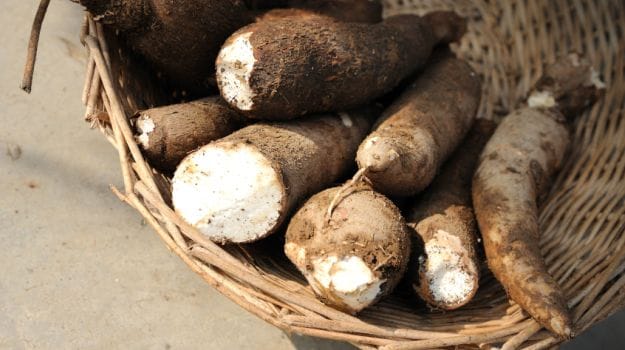Cassava, the starch rusty-coloured root that is a staple in Nigeria, is a paradigm of the problem the import-dependent nation now faces as the plunge in oil prices crimps the economy. The root is used to make "eba" and "fufu" -- filling pastes that are beloved dishes in Nigerian homes -- but there are a myriad of uses for cassava, including making flour and beer.The problem -- and opportunity -- that cassava production presents is that Nigeria, Africa's most populous nation, does not produce as much as it could, nor of the quality to make it a thriving business.To enable Nigeria to wean itself off imports of rice and wheat, a project aims to help farmers ramp up cassava production through a new scheme with the support of the Bill and Melinda Gates Foundation.
"Nigeria spends 635 billion naira ($3.2 billion) annually on wheat importation," a leading agronomist and representative of the agriculture minister, Comfort Doyin Awe, said.Cassava should emerge as a wheat substitute instead, with Nigerians baking loaves of cassava bread, she told experts at a meeting organised by the International Institute of Tropical Agriculture (IITA) in the southwestern city of Ibadan late last month.As it is eaten across west Africa, cassava could even become a much-needed foreign currency earner, if Nigerian farmers and processors can improve the quality of their production."We don't add value to our cassava. It will help Nigeria if we do that. We need good quality cassava flour," Awe said.Need finance, fertiliser, toolsWhile prices are high Nigeria's oil exports bring in plenty of foreign exchange earnings, helping underpin an exchange rate for the naira that allows the country to import major amounts of wheat flour.
But as prices have crashed from above $100 per barrel in July 2014 to around $30 now the country can no longer afford to do so.So far the leaders have preferred to limit access to foreign currency to support the exchange rate for the naira, but that approach will soon choke off imports and many see the government ultimately being forced to devalue the unit, making imported wheat unaffordable for many.That means Nigerians will increasingly look to cassava farmers like Sifawu Safiu.But that hope looks forlorn as she yanks out tubers from the red soil in a village on the outskirts of Ibadan, shaking her head with disappointment."I am not happy with the cassava my farm is yielding," the 61-year-old told AFP."I don't use fertiliser. I need financial help to improve my yield."Fatima Taju, another farmer working on a nearby farm, said she needs better tools.
Unable to afford machines to do the heavy work, small farmers use hoes and machetes to harvest their crops.The mostly illiterate farmers have scarce funds to buy fertilisers or pesticides and often cannot access resources to learn better cultivation methods.As a result, cassava output in sub-Saharan Africa stands at 10 tonnes per hectare, far below potential yields of more than 30 tonnes.Improve yields, quality, supply, incomes -Decades of neglect of the farming industry will have to be overcome quickly if the nation of about 170 million people is to dodge an impending food crisis due to a reliance on rice and wheat imports.
That is where the African Cassava Agronomy Initiative steps in with $14.4 million in funding from the Gates' foundation.It aims to improve cassava yields in Nigeria, Ghana, Tanzania, Uganda and the Democratic Republic of Congo through teaching farmers modern ways of planting and weeding, and linking them up to loan and fertiliser sources."This will massively improve the yield and income of farmers," IITA spokesman Godwin Atser said, with improving quality also a goal of the programme.Up to 150,000 households across the five countries are expected to benefit from the cassava cultivation scheme during its five-year timeframe, said IITA's director for central Africa, Bernard Vanlauwe."The value of benefits from this project ... is expected to rise to at least $40 million" during its five-year span, he said.
"Nigeria spends 635 billion naira ($3.2 billion) annually on wheat importation," a leading agronomist and representative of the agriculture minister, Comfort Doyin Awe, said.Cassava should emerge as a wheat substitute instead, with Nigerians baking loaves of cassava bread, she told experts at a meeting organised by the International Institute of Tropical Agriculture (IITA) in the southwestern city of Ibadan late last month.As it is eaten across west Africa, cassava could even become a much-needed foreign currency earner, if Nigerian farmers and processors can improve the quality of their production."We don't add value to our cassava. It will help Nigeria if we do that. We need good quality cassava flour," Awe said.Need finance, fertiliser, toolsWhile prices are high Nigeria's oil exports bring in plenty of foreign exchange earnings, helping underpin an exchange rate for the naira that allows the country to import major amounts of wheat flour.
But as prices have crashed from above $100 per barrel in July 2014 to around $30 now the country can no longer afford to do so.So far the leaders have preferred to limit access to foreign currency to support the exchange rate for the naira, but that approach will soon choke off imports and many see the government ultimately being forced to devalue the unit, making imported wheat unaffordable for many.That means Nigerians will increasingly look to cassava farmers like Sifawu Safiu.But that hope looks forlorn as she yanks out tubers from the red soil in a village on the outskirts of Ibadan, shaking her head with disappointment."I am not happy with the cassava my farm is yielding," the 61-year-old told AFP."I don't use fertiliser. I need financial help to improve my yield."Fatima Taju, another farmer working on a nearby farm, said she needs better tools.
Unable to afford machines to do the heavy work, small farmers use hoes and machetes to harvest their crops.The mostly illiterate farmers have scarce funds to buy fertilisers or pesticides and often cannot access resources to learn better cultivation methods.As a result, cassava output in sub-Saharan Africa stands at 10 tonnes per hectare, far below potential yields of more than 30 tonnes.Improve yields, quality, supply, incomes -Decades of neglect of the farming industry will have to be overcome quickly if the nation of about 170 million people is to dodge an impending food crisis due to a reliance on rice and wheat imports.
That is where the African Cassava Agronomy Initiative steps in with $14.4 million in funding from the Gates' foundation.It aims to improve cassava yields in Nigeria, Ghana, Tanzania, Uganda and the Democratic Republic of Congo through teaching farmers modern ways of planting and weeding, and linking them up to loan and fertiliser sources."This will massively improve the yield and income of farmers," IITA spokesman Godwin Atser said, with improving quality also a goal of the programme.Up to 150,000 households across the five countries are expected to benefit from the cassava cultivation scheme during its five-year timeframe, said IITA's director for central Africa, Bernard Vanlauwe."The value of benefits from this project ... is expected to rise to at least $40 million" during its five-year span, he said.
Advertisement









